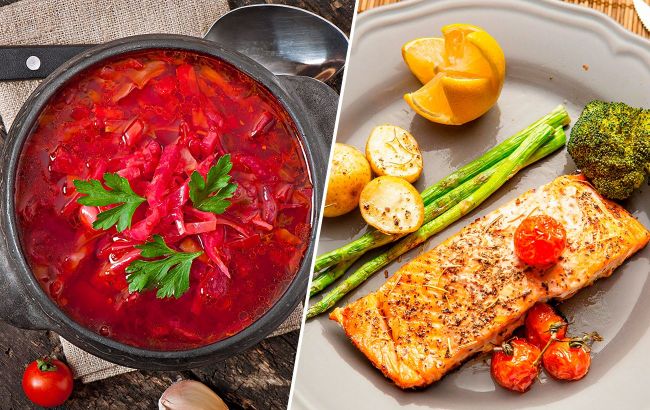Smart snacking: Low-calorie foods to manage weight
 What foods are low in calories (Collage RBC-Ukraine)
What foods are low in calories (Collage RBC-Ukraine)
There are foods that are very low in calories. They can serve as a great snack or become your helpers during weight loss. However, it is worth remembering that such dishes will not be able to satisfy you qualitatively and give you enough nutrients. Therefore, more saturated products should be added to them, writes WebMD.
Oatmeal
A bowl of this porridge in the morning will help you last all day and the reason is partly in the fibers. They saturate and allow the body to absorb the nutrients of oatmeal more slowly. This keeps your energy stable and will allow you to consume fewer calories throughout the day.
Soup
The liquid helps to fill the stomach but does not add many calories because it is usually cooked with a lot of water. Be sure to choose a broth-based recipe, such as vegetable soup or soup made with chicken or beef broth. Cream-based soups contain much more calories.
Salad
Part of the secret to staying full without gaining weight is to eat foods with fewer calories per bite. It's hard to beat lettuce and other vegetables. Along with fiber, many of them are rich in vitamins and minerals. For the first course, eat a salad or eat a small portion before the main meal to avoid eating too much. Just don't add too many unhealthy toppings like cheese, croutons, and dressings.
Nuts
They are high in fat, which gives them more calories per bite. That's bad, right? Not necessarily. The fat and protein in nuts can prompt your body to release hormones that help you feel full. In addition, fats are unsaturated, "good" fats that also help lower cholesterol and blood sugar. Just watch the portion size. A handful is all you need.
Avocado
Although they are full of fat, people who eat them in moderation tend to have less fat. Part of the reason may be that if you eat avocados, you're more likely to eat a lot of vegetables, too. However, portion size is critical. One-third of a medium avocado contains about 106 calories. But they are delicious even with a thin slice of whole wheat toast.
Eggs
If your goal is to stay full until lunch, this is a better choice for breakfast than a bowl of cereal. They have fewer calories than you think - 78 in a large, hard-boiled egg - and a lot of protein. They are so filling that they will help you eat less throughout the day if you eat them for breakfast, especially if you are overweight.
Cheese
It's a good substitute if you don't like eggs because they seem to have the same effect on appetite. At 163 calories per cup, low-fat cottage cheese also contains protein and is a better hunger-satisfier.
Fish
It's a healthy source of protein that makes you feel fuller than carbohydrates. In addition, the omega-3 fatty acids found in many seafood products, especially fatty fish such as salmon, are particularly good at suppressing hunger.
Beans
People who eat them often feel more satisfied between meals. In the long run, this can lead to less body fat and a healthier weight. This makes sense: they are low in calories, but contain a lot of protein and fiber.
Foods that will leave you hungry
Highly processed foods like soda, candy, and even white bread are nutrient-poor and immediately release too much sugar into the bloodstream.
Your body stores the excess as fat and makes you crave more.
Lean protein, unsaturated fats, and carbohydrates with lots of fiber and nutrients (such as whole grains, fruits, and vegetables) take longer to digest, satisfy hunger, and provide a steady supply of energy.
How full (and saturated) you will be depends not only on food. If you don't get enough sleep, you may eat more than you need. And you will most likely prefer snacks that are higher in calories and fat.
Exercise will help burn those calories. You should exercise about 30 minutes a day, at least 5 days a week.
Even 10 minutes throughout the day can make a big difference in how your body uses the food you eat.
By the way, earlier we talked about the 5 myths about nutrition that most people believe.

